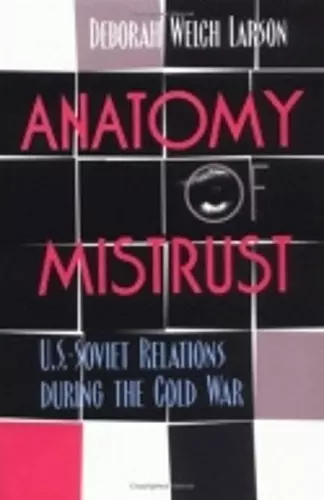Anatomy of Mistrust
U.S.-Soviet Relations during the Cold War
Format:Paperback
Publisher:Cornell University Press
Currently unavailable, and unfortunately no date known when it will be back
This paperback is available in another edition too:
- Hardback£49.00(9780801433023)

The United States and the Soviet Union missed numerous diplomatic opportunities to resolve differences and control the arms race because neither state trusted the other, according to Deborah Welch Larson. In Anatomy of Mistrust, She shows that the goals of Soviet and U.S. leaders were frequently complementary, and an agreement should have been attainable. Lost opportunities contributed to bankruptcy for the Soviet Union, serious damage to the economy of the United States, decreased public support for internationalist policies, and a proliferation of nuclear weapons.
Synthesizing different understandings of trust and mistrust from the theoretical traditions of economics, psychology, and game theory, Larson analyzes five cases that might have been turning points in U.S.-Soviet relations: the two-year period following Stalin's death in 1953; Khrushchev's peace offensive from the launching of Sputnik until the U-2 incident; the Kennedy administration; the Nixon-Brezhnev detente; and the Gorbachev period. Larson concludes that leaders in the United States often refused to accept Soviet offers to negotiate because they feared a trap. Mutual trust is necessary, she concludes, although it may not be sufficient, for states to cooperate in managing their security.
A welcome addition to revisionist explorations of Cold War history.... Beyond their clear academic value, the findings of this book should serve as a lesson to policy makers: those who wish to build trust in a hostile climate must first build a reputation for conciliatory consistency in the eyes of their opponents.
* Political Science Quarterly *An excellent book arguing that excessive mistrust, rather than irreconcilable conflicts of interest or differences in domestic systems, best explains the superpowers' failure to reach mutually beneficial agreements and their difficulty in negotiating even minor accords, as well as the severity and duration of the Cold War.... Larson has done an outstanding job of showing that the Cold War need not have developed, endured, or ended precisely as it did.
* Choice *By carefully combining traditional primary sources, conventional histories of the period, and newly available Soviet-era documents, Larson has produced a scholarly and eminently readable work. Readers prepared to delve into the underlying psychology of the Cold War will benefit from reading this book.
* Military Review *Deborah Larson gives the problem of trust a fresh treatment, combining psychology with original historical research to demonstrate that, contrary to many popular assumptions, there were missed opportunities for mitigating, if not ending, the Cold War.
* Lingua Franca *Larson's introduction provides a sophisticated basis for understanding how the psychology, ideology, and political domestic situation of decision makers affects their perception of opponents' motives and offers.... Larson concisely but comprehensively presents the context of negotiation and establishes confidence in the counterfactual exercises to which her general topic necessarily leads.... Anatomy of Mistrust is an excellent, original, and substantially useful book for readers and instructors seeking an intelligent conceptual overview of crucial Cold War episodes.
* Journal of American HistoISBN: 9780801486821
Dimensions: 235mm x 155mm x 22mm
Weight: 454g
352 pages